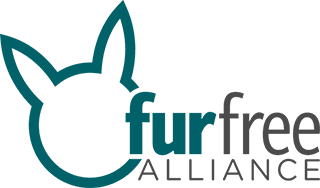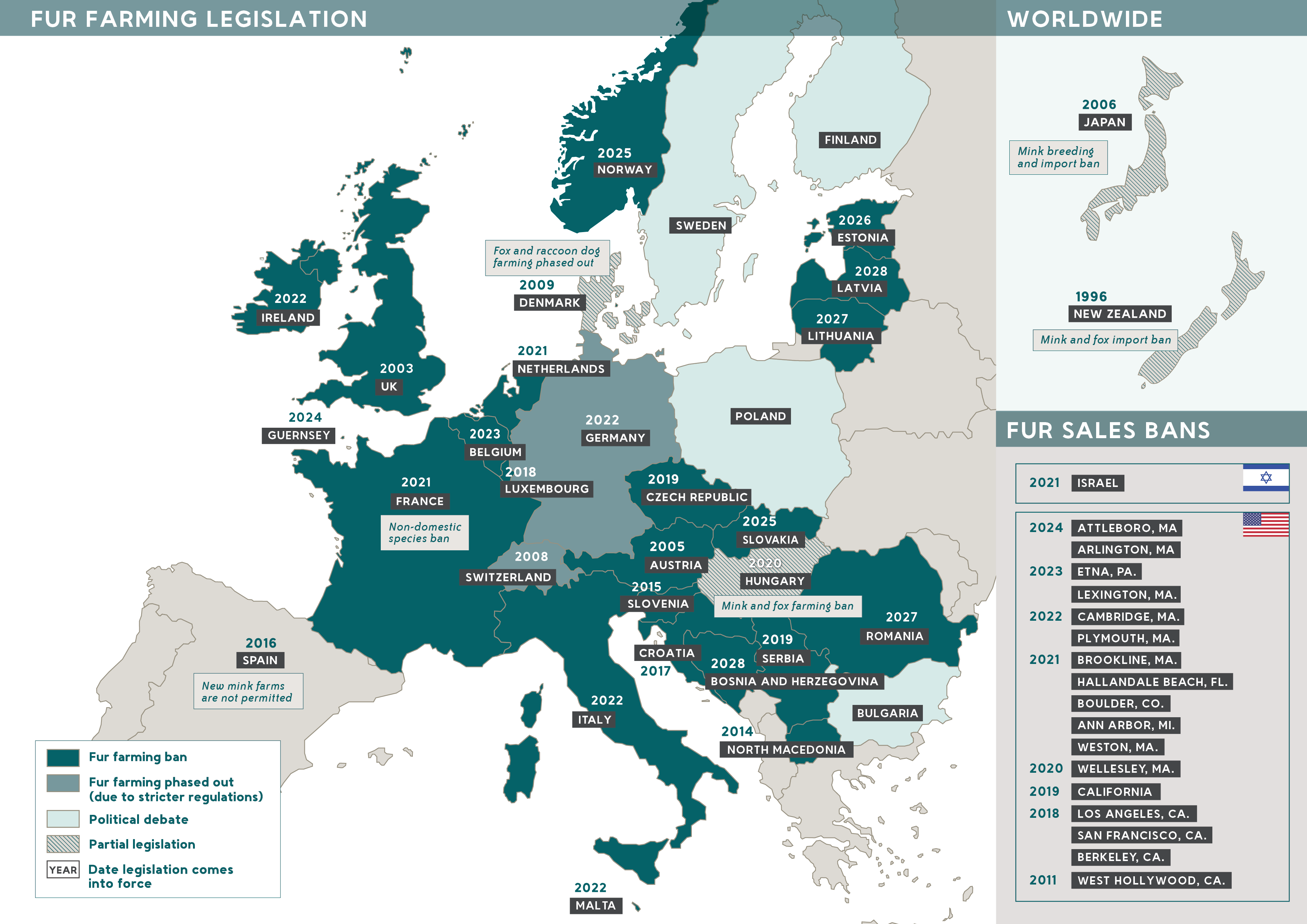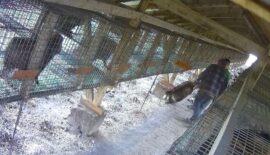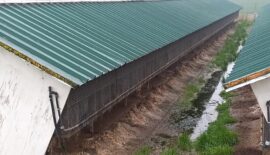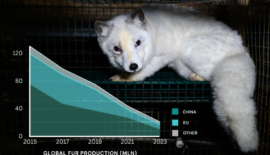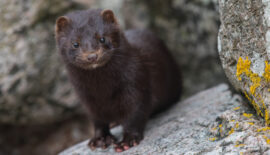In the last two decades, more than 25 countries have either voted to ban fur farming, have prohibited the farming of certain species, or have introduced stricter regulations that have effectively curtailed the practice. As concerns about animal welfare, the ethics of fur and public health continue to grow, proposals to ban fur production are presently being considered in many other countries.

Fur bans
Fur production bans
The first countries to end fur farming were the UK (2003) and Austria (2005). The Netherlands, once the EU’s second-largest mink producer, moved up its timeline for shutting down the industry from 2024 to 2021, following COVID-19 outbreaks on Dutch fur mink farms.
In 2018, Norway, once the world’s largest producer of fox fur, decided to end fur farming following shocking evidence of welfare violations on fox and mink fur farms.
In October 2024, Romania became the most recent country to prohibit fur farming with a phase-out period until 2027. In the two preceding years, Lithuania voted for a similar ban to go into effect in 2027, Latvia introduced legislation to end fur farming scheduled to go into effect in 2028, and Ireland banned fur farming and shut down its three remaining mink fur farms.
France introduced a prohibition on the breeding of non-domestic species for fur in 2021. The ban went into immediate effect which led to the closure of the two remaining French fur farms. In 2024, the island of Guernsey introduced a ban on fur farming.
In 2021, the provincial government of British Columbia in Canada introduced a phase-out of mink fur farming by April 2023, following multiple coronavirus outbreaks on BC mink farms.
Moves to end fur farming are currently underway in Bulgaria, Poland, Sweden and Finland.
FUR SALES BANS
Ending the sales of fur will decrease demand for cruel products, reduce public health risks, promote community awareness of animal welfare and foster a more humane environment.
In 2021, Israel became the world’s first country to prohibit the sale of fur.
In the United States, Los Angeles, San Francisco, Berkeley, and West Hollywood banned new fur sales, paving the way for California to become the first fur-free state in 2019. Cities in Massachusetts, Michigan, and Florida have since passed similar legislation.
Certain species
Hungary adopted an immediate ban on the breeding of mink, foxes, polecats, and coypu for fur, in November 2020, following concerns about animal welfare and coronavirus outbreaks on mink fur farms across Europe. The ban was introduced as a precautionary measure to prevent fur farmers from moving their operations there.
Denmark introduced a ban on fox farming in 2009. In addition, Denmark prohibited the building of new raccoon dog farms in 2011, which led to an effective ban since there are no raccoon dog farms in Denmark.
Before The Netherlands adopted a ban on mink fur farming in 2013, fox and chinchilla fur production was already out-phased in the mid-1990s.
STRICTER WELFARE REGULATIONS
Germany introduced new animal welfare legislation in 2017, with a 5-year transition period, that required stricter keeping standards (such as increased cages sizes and additional swimming basins for mink). The new regulations meant that fur farming was no longer deemed profitable and this led to the closure of the last remaining mink farms in 2019, before the new measures came into force.
The introduction of stricter animal welfare requirements in Sweden led to the closure of fox fur farms in 2005 and chinchilla fur farms in 2014. The new measures addressed some natural needs of the two species, to enable chinchillas to jump, and foxes to dig and socialize. The new requirements rendered fox and chinchilla farming economically unviable in Sweden.
Switzerland introduced legislation in 2008 that allowed animals to be kept captive only in conditions that are equivalent to modern zoos. Fur farming under such rules was deemed to be unprofitable and no longer takes place in the country.
Ecological restrictions
To prevent ecological damage caused by escaped mink as an invasive alien species, Bulgaria introduced a ban on the breeding and import of American mink in 2022, which was suspended shortly after due to an appeal. Spain adopted stricter regulations on similar grounds in 2016 which prohibit the building of new mink fur farms.
In 2006, the Japanese Invasive Alien Species Act made it illegal to breed and import American mink, while existing mink fur farms were allowed to continue under strict conditions. This led to the phasing-out of fur farming in Japan in 2016 following the closure of the last mink fur farm due to non-compliance.
To protect local biodiversity, it is prohibited to import mink, foxes and coypu in New Zealand according to the Hazardous Substances and New Organisms Act 1996, which effectively bans fur farming of these species in the country.
| Production bans | Enacted | Effective |
| Romania | 2024 | 2027 |
| Guernsey | 2024 | 2024 |
| Lithuania | 2023 | 2027 |
| Latvia | 2022 | 2028 |
| Malta | 2022 | 2022 |
| Estonia | 2021 | 2026 |
| Italy | 2021 | 2022 |
| France | 2021 | 2021 |
| Ireland | 2019 | 2022 |
| Norway | 2019 | 2025 |
| Slovakia | 2019 | 2025 |
| Belgium | 2018 | 2023 |
| Luxembourg | 2018 | 2018 |
| Czechia | 2017 | 2019 |
| The Netherlands | 2013 | 2021 |
| North Macedonia | 2014 | 2014 |
| B & H | 2009 | 2028 |
| Serbia | 2009 | 2019 |
| Croatia | 2007 | 2017 |
| Austria | 2004 | 2005 |
| Slovenia | 2013 | 2015 |
| United Kingdom | 2000 | 2003 |
Details national fur legislation: view PDF or Google Sheet
